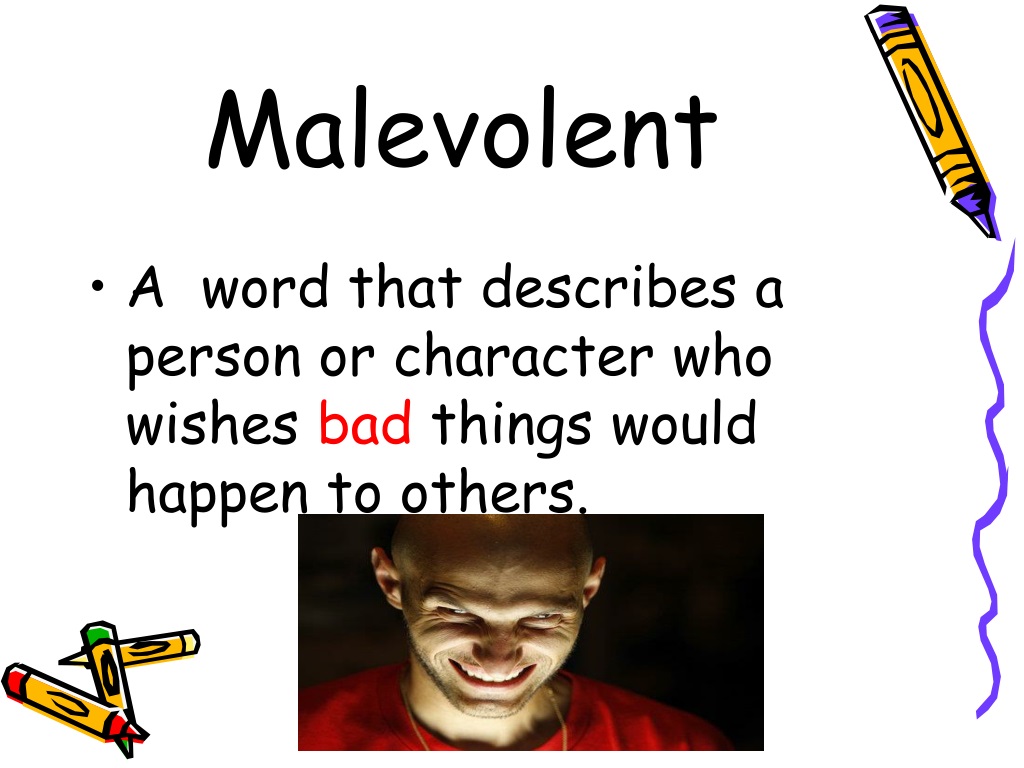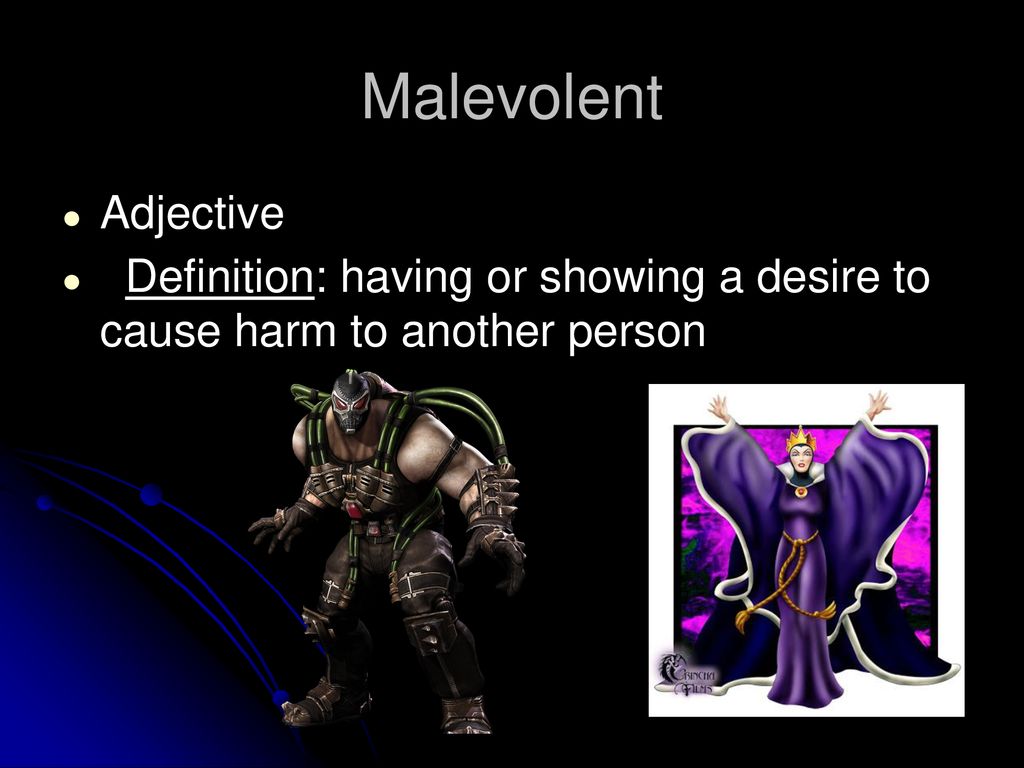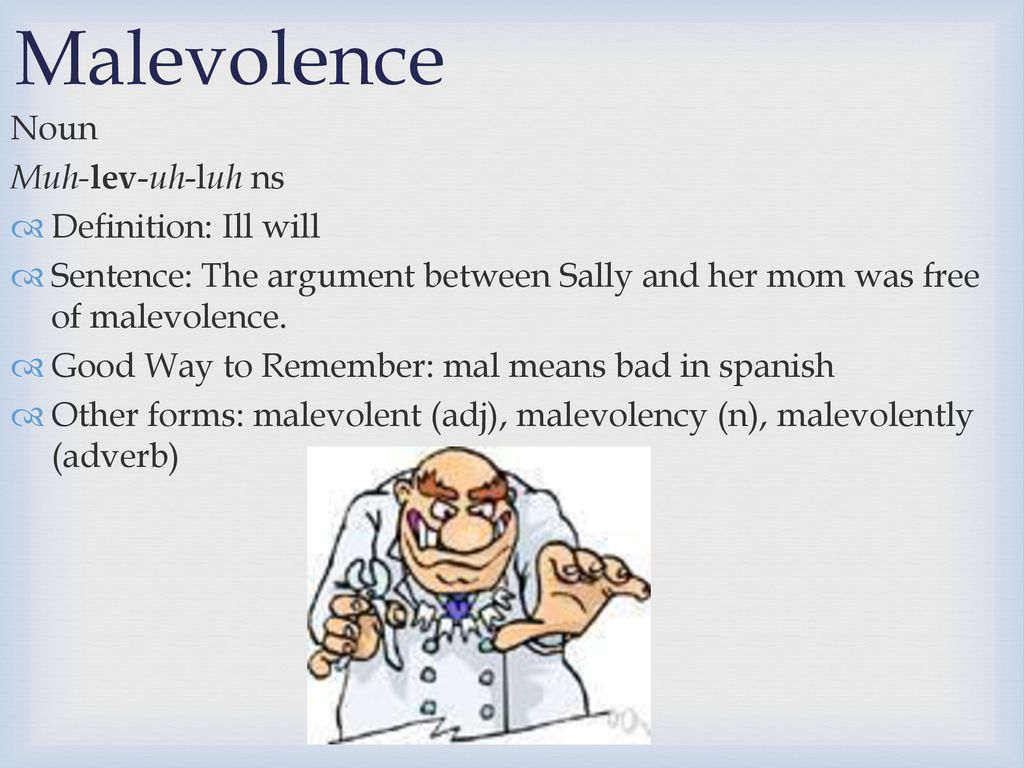Malevolent Definition - What It Really Means
## Humanized Version
Have you ever come across a word that just feels a bit heavy, almost like it carries a certain weight or a chill? Well, "malevolent" is certainly one of those words. It is that kind of term that suggests something quite unpleasant, a disposition that seems to want to bring about difficulty or even outright suffering for others. When we hear it, our thoughts often go to intentions that are not at all good, a desire to cause trouble, or a strong, bitter dislike that really shows itself in someone's actions.
This word, you know, paints a picture of a mindset where a person holds a deep, often hurtful, desire to see others struggle. It's not just a passing bad mood; it is, in a way, a more settled inclination to wish ill upon someone, or even to actively work towards their unhappiness. It speaks of a heart that might harbor a very strong, often fierce, ill will, a kind of spite that can feel quite cutting.
So, when we talk about what "malevolent" means, we are really talking about a person or an influence that wishes to create harm or trouble. It is about someone who might even enjoy the thought of others facing hardships, or who might actively try to make those hardships happen. It is a word that describes a certain kind of spirit, one that is, honestly, quite contrary to kindness and good wishes.
Table of Contents
- What Does "Malevolent" Truly Mean?
- Where Does Such a Feeling Begin?
- How Do We Notice a Malevolent Disposition?
- What's the Opposite of Being Malevolent?
- Why Does This Word Continue to Matter?
What Does "Malevolent" Truly Mean?
When we think about what the word "malevolent" truly suggests, it is, you know, about a deep-seated desire to cause hurt or trouble. It describes a person who has, or shows, a very strong and often cruel bad will. This isn't just a fleeting thought or a momentary annoyance; it is a more enduring feeling, a kind of internal state that pushes someone to wish for, or even bring about, difficult outcomes for others. It is, basically, the opposite of wishing someone well.
Picture someone who, for instance, finds joy in another person's setbacks. That feeling, that inclination to tear down someone else's good fortune, is a very clear sign of what "malevolent" points to. It is the kind of mindset that might lead someone to deliberately try to make things go wrong for someone else, or to spread unhappiness. It is, honestly, a very heavy word because it touches on the darker side of human feelings, the part that seeks to cause pain rather than comfort.
The core of this idea, so, is about a wish to inflict damage or to see evil happen. It can describe a person who actively works to destroy the good feelings of others, or who simply has an influence that brings about something harmful. This could be a person who speaks unkindly, or who acts in ways that are meant to cause distress. It is, in a way, a description of a spirit that is not at all friendly or supportive.
Getting to Grips with the Malevolent Definition
To really get a good handle on the "malevolent definition," we can look at a few aspects. It often comes from a place of intense ill will, a feeling that is, quite frankly, very bitter. This can show up as a desire to harm other people, or a general feeling of spite. Imagine someone who has experienced failures and, as a result, becomes very much against those who have found success. That feeling, that resentment that turns into a wish for bad things to happen to others, is a prime example of this word in action.
It is about a disposition that is, in some respects, quite hurtful. It is not just about feeling bad yourself; it is about wanting others to feel bad too. The word really captures that sense of a person who has a strong drive to cause trouble or to see things go wrong for others. This can be a very powerful, even consuming, feeling for the person who holds it, and it can certainly have a very clear impact on those around them.
Think of a gossipy old woman, for instance, who seems to enjoy spreading unpleasant stories about others. Her actions, so, might stem from a malevolent inclination, a desire to undermine the happiness of those around her. It is about a spirit that seems to wish evil, or at least discomfort, upon others. This desire to harm, or to see others suffer, is really at the heart of what this word means, and it is, obviously, a very negative characteristic.
Where Does Such a Feeling Begin?
Where does this kind of feeling, this malevolent spirit, actually come from? Well, it often seems to arise from a very strong and sometimes cruel sense of ill will, a deep-seated dislike or even bitter hatred. It is, in a way, a feeling that can take root when someone feels wronged, or perhaps when they have faced personal disappointments. For instance, the text mentions how failures might cause someone to feel this way toward others who are doing well. It is, you know, a very human response, though not a positive one, to feel bitterness when you see others succeed where you have not.
This feeling can, honestly, grow out of a place of deep frustration or a sense of being unfairly treated. When someone holds onto these feelings, they can, in some respects, fester and turn into a desire to see others experience similar difficulties. It is a kind of souring of the spirit, where good wishes for others are replaced by a wish for their misfortune. This transformation from personal struggle to a harmful outlook on others is, basically, what the origin of such a feeling might look like.
The Origins Behind the Malevolent Definition
When we look at the historical journey of the "malevolent definition," the word has, apparently, carried a similar sense for a very long time. It has always pointed to a desire to cause harm or evil. The original uses of the word, as a matter of fact, really emphasized this idea of having a hurtful intention. Some of its older meanings, the text tells us, are not really used anymore, but the core idea of wishing bad things for others has remained.
It is, you know, interesting to think about how words change over time, but this one has, pretty much, kept its central, rather dark, meaning. The idea of a person deliberately trying to cause harm or evil, or wishing it upon others, has been a consistent thread throughout its history. So, while some of the specific ways it was used might have faded, the fundamental concept of a hurtful disposition has, actually, stayed the same.
This consistency suggests that the concept of having a wish for ill upon others is, in a way, a fairly constant part of human experience. It is a feeling that people have recognized and named for a very long time, because, well, it is something that unfortunately exists. The word itself, therefore, acts as a clear marker for this particular kind of human sentiment, one that is, obviously, not at all pleasant to encounter.
How Do We Notice a Malevolent Disposition?
How can we tell if someone has a malevolent disposition? Well, it often shows up in their actions and their general attitude toward others. A person with such a spirit might, for instance, take pleasure in the misfortunes of others. They might make comments that are designed to hurt, or they might actively try to undermine someone's efforts. It is, as a matter of fact, about a pattern of behavior that clearly indicates a desire to cause trouble or to see others suffer.
Think about someone who seems to always have a negative comment ready when someone else achieves something good, or who spreads rumors that are meant to damage reputations. These kinds of actions are, basically, outward signs of an inner wish to cause harm. It is not just about being grumpy or in a bad mood; it is about a more intentional effort to bring about bad outcomes for others. This desire to harm, or to see evil happen, is, quite honestly, what we are looking for when we try to spot this kind of disposition.
Sometimes, this inclination can be quite subtle, a slight sneer when good news is shared, or a quiet whisper that casts doubt on someone's intentions. Other times, it can be very overt, like someone directly trying to sabotage another person's work or happiness. It is about a consistent drive to cause distress or to destroy the good feelings of others. This kind of attitude, you know, is very much rooted in a wish for ill upon others, and it is, obviously, something that can be quite damaging to those on the receiving end.
Seeing the Malevolent Definition in Action
When we talk about seeing the "malevolent definition" in action, we are really talking about how this harmful inclination plays out in real life. The text gives an example of someone whose failures lead them to feel this way toward those who are successful. This is a very common way that such a spirit can manifest. It is, you know, a bitter feeling that turns outward, seeking to diminish the achievements of others because one's own efforts have not gone well.
Another way to see it in action is through a "malevolent inclination to destroy the happiness of others." This suggests a deliberate choice, a conscious effort to take away joy or contentment from someone else. This could be through spreading unkind words, through sabotage, or just through a general attitude that dampens the spirits of those around them. It is, basically, a very active form of wishing ill, where the person not only wishes it but also works to make it happen.
Even something as simple as a "gossipy malevolent old woman" shows this in a very clear way. Her gossip is not just idle chatter; it is, in a way, meant to cause trouble, to stir up bad feelings, or to hurt someone's standing. Her words are, essentially, tools used to inflict small harms, driven by that underlying desire to see others face difficulties. So, it is about actions, both big and small, that are rooted in that core wish to cause harm or evil.
What's the Opposite of Being Malevolent?
So, if "malevolent" is all about wishing bad things for others, what is the opposite? Well, the text tells us quite clearly that its opposite is "benevolent." This word, "benevolent," suggests a completely different kind of spirit. It means wishing good things for others, having a kind and generous disposition. Where one wants to cause harm, the other wants to bring about well-being and happiness. It is, you know, a very stark contrast between two ways of being in the world.
Imagine someone who actively tries to help others, who celebrates their successes, and who offers comfort in times of trouble. That person would be acting from a benevolent spirit. They are driven by a desire to do good, to support, and to uplift. This is, basically, the complete reverse of a malevolent person, who might, as a matter of fact, try to do the exact opposite. The difference is, honestly, quite profound, like night and day.
One person seeks to build up, to spread kindness, and to contribute positively to the lives of those around them. The other, the malevolent one, seeks to tear down, to cause pain, and to bring about negative outcomes. So, while "malevolent" speaks of a hurtful inclination, "benevolent" speaks of a generous and kind one. It is, in a way, the difference between a spirit that brings light and one that brings shadows to the lives of others.
The Other Side of the Malevolent Definition
When we consider the "malevolent definition," it is often helpful to also think about its counterpart, "benevolent." This helps us to really grasp the full scope of what "malevolent" means by seeing what it is not. A benevolent person, for instance, would be someone who genuinely wishes for the good fortune of others, and who acts in ways that support that wish. They would not be driven by spite or ill will; instead, they would be moved by kindness and a desire to help.
The core difference lies in the intention. A malevolent person has an intention to harm, while a benevolent person has an intention to help. This distinction is, obviously, very important when we are trying to understand human behavior and the impact people have on one another. It is about whether someone brings good or bad into the lives of those they interact with. So, in some respects, looking at the opposite helps to sharpen our picture of the original word.
It is like looking at two sides of a coin, really. One side represents the desire to cause trouble, to be hurtful, to act from a place of intense dislike. The other side represents the desire to be kind, to be helpful, and to act from a place of good will. Understanding "benevolent" truly helps to highlight just how much ill will is packed into the meaning of "malevolent," showing that it is, actually, a very strong word for a very negative sentiment.
Why Does This Word Continue to Matter?
Why do words like "malevolent" stick around in our language? Well, it is, you know, because they describe very real aspects of human experience and human feelings. Even though some of its older meanings might have faded, the core idea of wishing or causing harm remains highly relevant. We still encounter people and situations where such an intention is clearly present, and having a word that precisely captures that sentiment is, basically, very useful.
The word provides a clear way to name a specific kind of negative disposition, one that goes beyond just being mean or unkind. It points to a deeper, more intense desire to cause trouble or evil. So, when we use "malevolent," we are not just saying someone is bad; we are, as a matter of fact, describing a very particular type of badness, one rooted in a strong sense of ill will or hatred. This precision is, honestly, why such words continue to be important in our everyday conversations and in our understanding of others.
The Lasting Impact of the Malevolent Definition
The lasting impact of the "malevolent definition" is that it allows us to identify and discuss a specific kind of hurtful intention. It helps us to recognize when someone's actions are not just accidental, but are driven by a deliberate wish to cause harm or evil. This distinction is, obviously, very important for understanding social dynamics, personal relationships, and even larger societal issues. It is about being able to name the precise nature of a harmful influence.
The word also serves as a reminder of the power of intentions. A malevolent intention, whether acted upon or simply held as a feeling, can have a very real effect on the atmosphere around a person and on the well-being of others. It is, in a way, a word that highlights the darker side of human nature, and our need to be aware of it. So, its continued presence in our language means we still need a way to describe this particular, rather unsettling, human trait.

PPT - ROOT WORDS PowerPoint Presentation, free download - ID:9417458

BEOWULF VOCABULARY Part I. - ppt download

Malevolence Definition